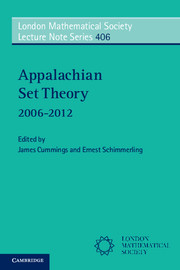Book contents
- Frontmatter
- Contents
- Contributors
- Introduction
- 1 An introduction to ℙmax forcing
- 2 Countable Borel equivalence relations
- 3 Set theory and operator algebras
- 4 A tutorial on Set Mapping Reflection
- 5 An introduction to hyperlinear and sofic groups
- 6 Aronszajn trees and the SCH
- 7 Iterated forcing and the Continuum Hypothesis
- 8 Short extender forcing
- 9 The complexity of classi?cation problems in ergodic theory
- 10 On the strengths and weaknesses of weak squares
- 11 Proper forcing remastered
- 12 Set theory and von Neumann algebras
- 13 The HOD Dichotomy
6 - Aronszajn trees and the SCH
Published online by Cambridge University Press: 05 December 2012
- Frontmatter
- Contents
- Contributors
- Introduction
- 1 An introduction to ℙmax forcing
- 2 Countable Borel equivalence relations
- 3 Set theory and operator algebras
- 4 A tutorial on Set Mapping Reflection
- 5 An introduction to hyperlinear and sofic groups
- 6 Aronszajn trees and the SCH
- 7 Iterated forcing and the Continuum Hypothesis
- 8 Short extender forcing
- 9 The complexity of classi?cation problems in ergodic theory
- 10 On the strengths and weaknesses of weak squares
- 11 Proper forcing remastered
- 12 Set theory and von Neumann algebras
- 13 The HOD Dichotomy
Summary
The eighth Appalachian Set Theory workshop was held at Carnegie Mellon University in Pittsburgh on February 28, 2009. The lecturer was Itay Neeman. As a graduate student Spencer Unger assisted in writing this chapter, which is based on the workshop lectures.
Introduction
The purpose of the workshop was to present a recent theorem due to Neeman [16].
Theorem 1.1From large cardinals, it is consistent that there is a singular strong limit cardinal κ of cofinality ω such that the Singular Cardinal Hypothesis fails at κ and the tree property holds at κ+.
The notes are intended to give the reader the flavor of the argument without going into the complexities of the full proof in [16]. Having read these notes, the motivated reader should be prepared to understand the full argument.We begin with a discussion of trees, which are natural objects in infinite combinatorics. One topic of interest is whether a tree has a cofinal branch. For completeness we recall some definitions.
Definition 1.2 Let λ be a regular cardinal and κ be a cardinal.
A λ-tree is a tree of height λ with levels of size less than λ.
A cofinal branch through a tree of height λ is a linearly ordered subset of order type λ.
A λ-Aronszajn tree is a λ-tree with no cofinal branch.
A κ+-tree is special if there is a function f : T → κ such that for all x; y ∈ T, if x T y then f(x) ≠ f(y).
- Type
- Chapter
- Information
- Appalachian Set Theory2006–2012, pp. 187 - 206Publisher: Cambridge University PressPrint publication year: 2012



